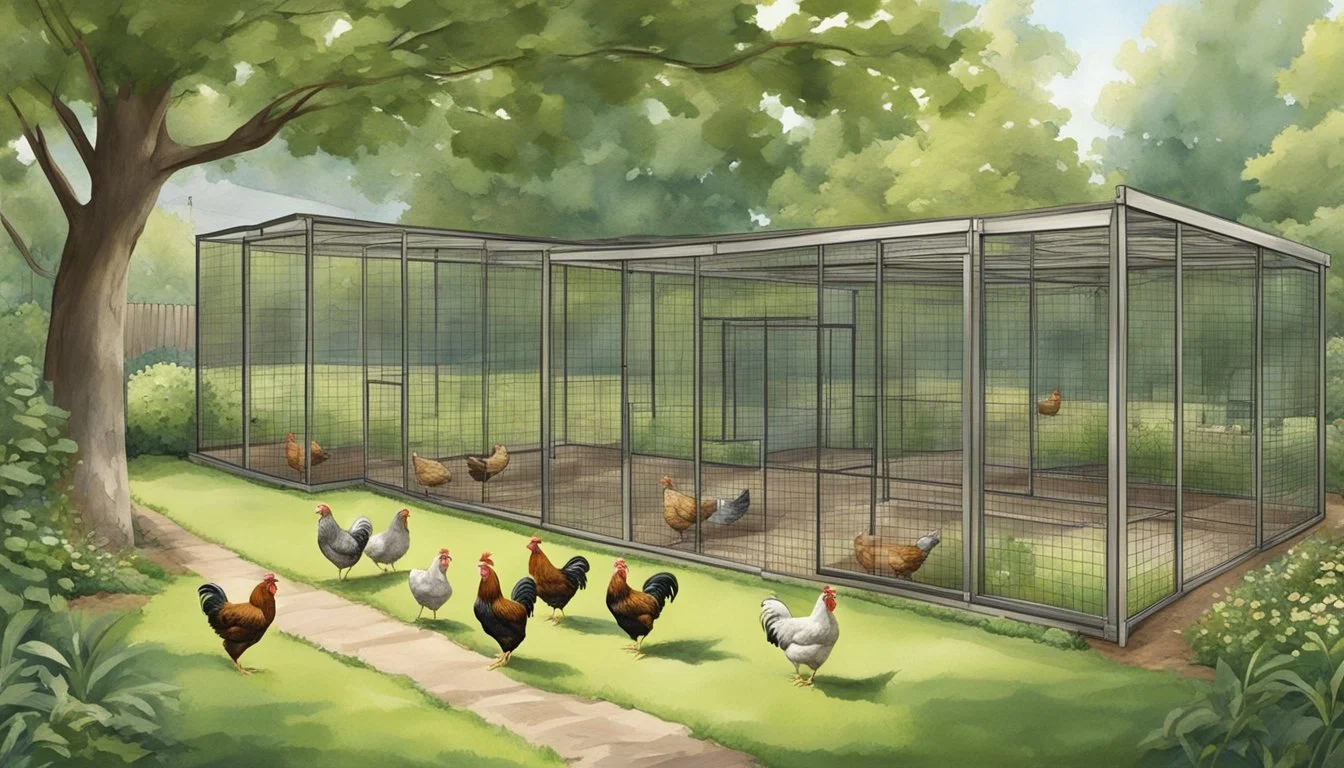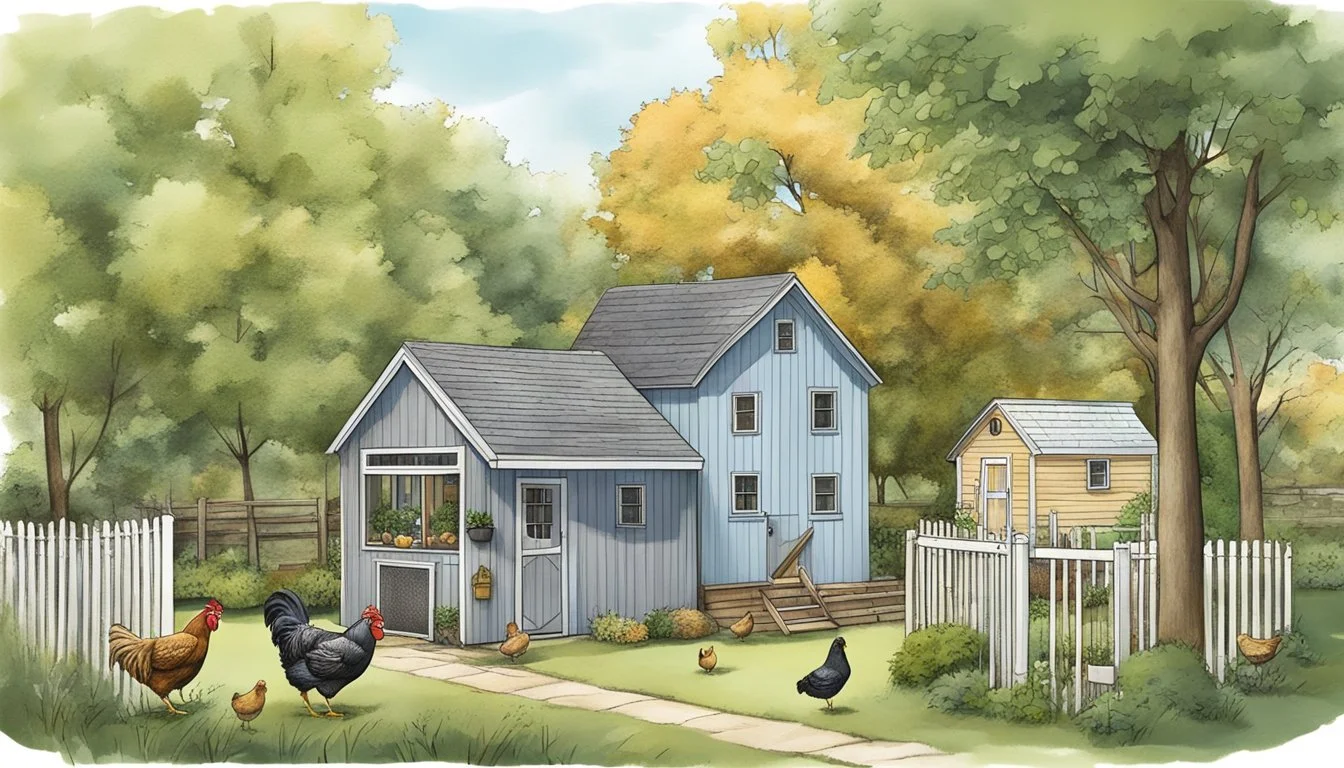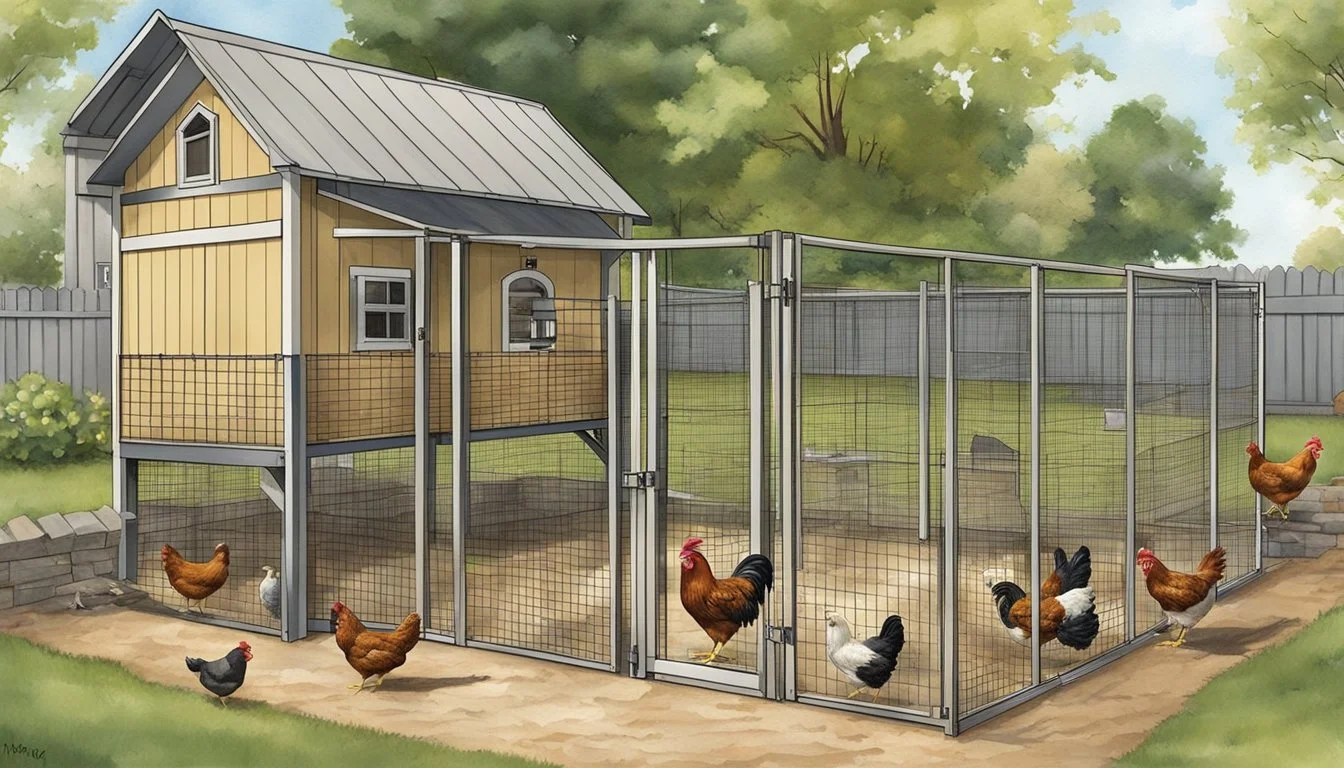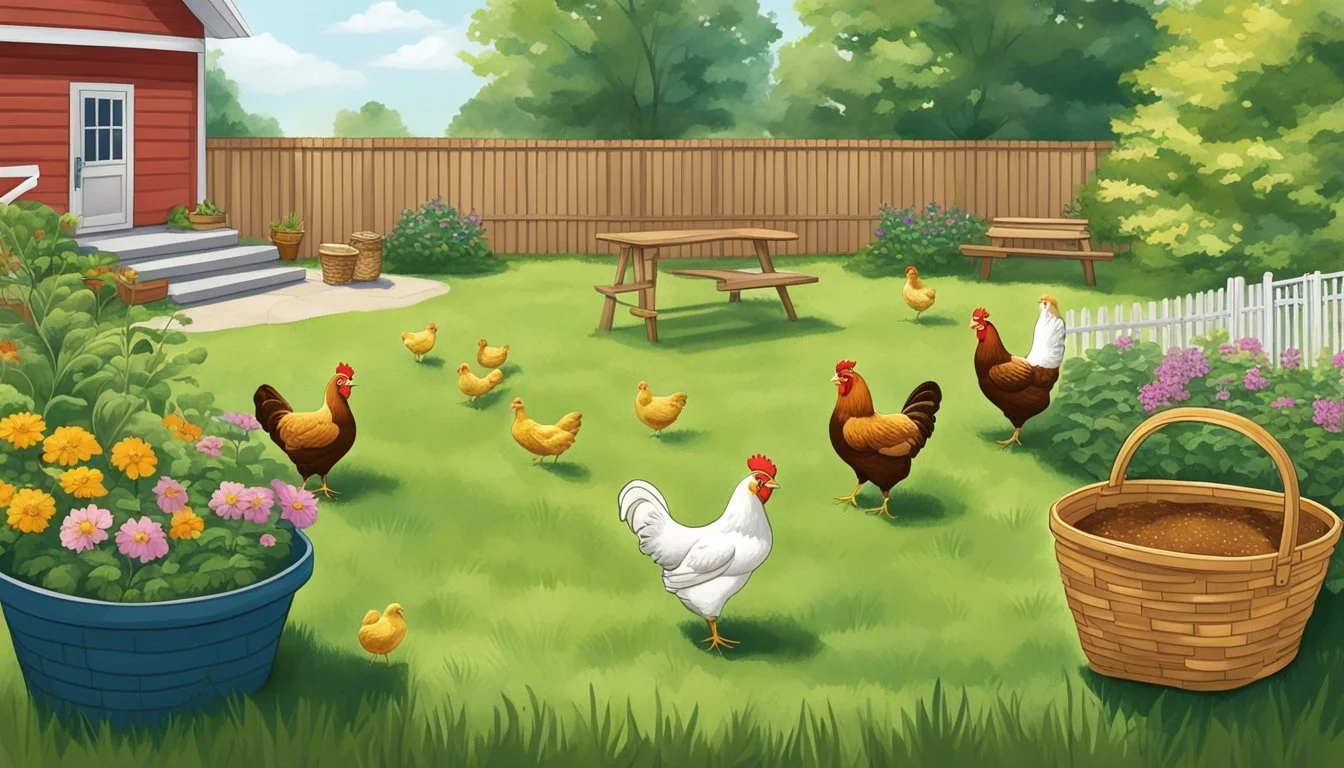Keeping Backyard Chickens in Rockford, IL
Essential Guidelines for Success
Keeping backyard chickens has become a growing trend across many cities in the United States, where ordinances allow. It offers residents the ability to have fresh eggs, natural pest control, and the enjoyment of caring for these animals. However, in Rockford, Illinois, the local regulations have been quite specific about the presence of chickens within the city limits. Historically, the city of Rockford has not permitted residents to keep chickens in their backyards, enforcing limitations on the type of livestock that can be housed on residential property.
The city has also identified restrictions concerning roosters, specifying that they are banned from within city boundaries to avoid noise disturbances. Moreover, there are rules against the slaughtering of chickens on residential premises within Rockford. This clear stance on backyard poultry keeping is in place to regulate urban animal husbandry, maintaining the balance between suburban lifestyles and aspects of agricultural living.
Recently, there's been a dialogue within the Rockford community regarding the potential revision of these regulations. Some residents have expressed interest in urban chicken farming, prompting discussions on possibly updating city ordinances to accommodate backyard chickens under certain conditions. Although no firm decisions have been made, this ongoing conversation reflects Rockford's responsiveness to the interests of its citizens and the evolving perspectives on urban agriculture.
Understanding Local Ordinances
Navigating the regulations governing the keeping of backyard chickens in Rockford, Illinois, requires a comprehensive understanding of local ordinances. These laws impact everything from the number of birds allowed to specific zoning rules that residents must follow.
Overview of Rockford Chicken Laws
In Rockford, local ordinances prohibit the keeping of chickens in residential backyards. Additionally, the ordinances ban the existence of roosters within the city limits and the on-site slaughtering of chickens within these areas. Homeowners' associations may also have their own set of rules that further restrict or prohibit chickens.
Zoning and Property Restrictions
The local zoning laws of Rockford are crucial in determining where chickens may be kept, if at all. Residential areas within the city limits are subject to these zoning ordinances, and current regulations prevent the keeping of backyard chickens. Understanding the specific zoning category of a property is essential for residents who wish to explore the possibility of keeping chickens.
Permits and Legal Requirements
Though chickens are not allowed in residential areas at this time, any future changes to ordinances would likely necessitate obtaining a permit. Should the laws change, it will be important to go through the proper legal channels, which may involve approval from city council members or adherence to specific permit requirements.
Limitations on Number and Type of Birds
Current Rockford city ordinances do not permit backyard chickens. Should this change through successful petitions or council actions, limitations would be in place regarding the number of chickens allowed, which typically excludes roosters, focusing on a set number of hens for egg production without the noise and disturbances roosters cause.
Setting Up Your Chicken Coop
Preparing a home for your chickens requires thoughtful planning in choosing the ideal location, constructing a secure and comfortable coop, and providing a well-designed outdoor run. These elements ensure the well-being of the chickens and ease of maintenance.
Choosing the Right Location
Selecting a spot for your chicken coop involves considering several factors to maximize the flock's health and safety. It should be on high, well-drained ground to prevent flooding and provide a dry environment. Exposure to sunlight is necessary for warmth and to keep the coop dry, yet it should also offer some shade to protect the chickens from overheating during warmer months. Keep it close to your house for convenient access in all weather conditions and to deter predators.
Designing Your Coop for Safety and Comfort
A chicken coop must balance comfort for the chickens with protection from various threats. Crucial features include:
Ventilation: Proper airflow is essential, but avoid drafts. Include vents or windows that can be opened or closed as needed.
Roofing: A solid roof protects against elements and predators.
Security: Use sturdy materials and ensure all openings, including doors and windows, are predator-proof with locks or latches.
Insulation: Adequate insulation helps regulate the internal temperature.
Listed below are the essentials for interior coop design:
Nesting boxes (one for every 3-4 hens)
Perches for sleeping (allow 8-12 inches per bird)
Easy-to-clean flooring with ample bedding material
Creating a Suitable Outdoor Run
The outdoor run is an extension of the coop, providing chickens space to forage and exercise, which is necessary for their health. Key points in designing a run:
Size: At least 10 square feet per chicken to prevent overcrowding.
Wire Mesh: Enclose the run with a strong wire mesh, buried underground to prevent predators from digging in.
Cover: A wire mesh or solid cover can protect chickens from aerial threats.
By adhering to these guidelines, one ensures the chickens have a safe, comfortable habitat in which they can thrive.
Chicken Care Best Practices
Keeping backyard chickens healthy and thriving in Rockford, IL, requires attention to several crucial care practices. Owners must engage in daily maintenance, ensure nutritional needs are met, and manage the social structure within the flock to maintain a peaceful coexistence among the birds.
Daily Maintenance and Monitoring
A backyard chicken keeper should diligently monitor their chickens each day for signs of distress or illness. Daily responsibilities include:
Checking food and water: Ensure that the feeders are full and the water is clean and unfrozen, particularly during winter months, when temperatures can drop significantly.
Observing behavior: Look out for abnormal behaviors such as reduced activity or excessive pecking, which could indicate health issues or stress within the flock.
Health and Nutrition
Providing a balanced diet and maintaining the health of the flock is essential. Key nutritional practices include:
Feeding:
Starter feed: Chicks should be given starter feed containing 18-20% protein.
Layer feed: Adult chickens require layer feed with 16-18% protein and added calcium for egg production.
Supplements: In addition to regular feed, chickens benefit from access to grit for digestion and oyster shell for extra calcium.
Frostbite prevention: During cold Illinois winters, applying petroleum jelly to combs and wattles can prevent frostbite on susceptible breeds.
Managing Flock Dynamics
Understanding and managing the flock's social hierarchy prevents undue stress and aggression. Strategies for managing flock dynamics include:
Introduction: Introduce new birds to the flock gradually to minimize disruptions and pecking order battles.
Space: Provide ample space to allow chickens to establish territories and avoid constant conflicts.
Distractions: Use perches or hanging vegetables as pecking toys to reduce boredom and aggression.
Legal Considerations for Slaughtering
When considering the slaughter of backyard chickens within Rockford, IL, residents must adhere to strict local ordinances. Slaughtering chickens on residential properties is not allowed within the city limits. This regulation ensures that animal processing is performed in appropriate locations that meet health and safety standards.
Residents interested in keeping chickens primarily for egg production may do so under certain conditions. A proposition was made that would permit homeowners to keep up to four hens, yet this number could be subject to change based on the most current legislation. Homeowners should review the local chicken laws to stay compliant.
Those examining the idea to raise chickens for meat must plan for processing off-site at a facility licensed for poultry slaughter. The following points should be taken into account:
Slaughtering at home is prohibited.
Chickens may only be kept for eggs and as pets.
External processing must comply with state regulations.
Before proceeding with any chicken-keeping activities, it is advisable to review the latest ordinance updates. Community guidelines, particularly in areas with Homeowners' Associations (HOAs), might have additional restrictions that surpass city regulations.
In summary, the legal stance on slaughtering backyard chickens in Rockford, IL is clear: it is not permitted within residential areas. Those who wish to raise chickens must be prepared to seek alternative methods for meat processing while ensuring their practices are within the bounds of all applicable laws.
Engaging with the Community
Engaging with the community is essential for the success of backyard chicken keeping in Rockford, IL. Residents who wish to keep chickens need to navigate neighborhood dynamics, participate in government processes, and share their knowledge about urban poultry farming.
Resolving Conflicts with Neighbors
When residents decide to keep backyard chickens, they should proactively address neighbors' concerns like noise, odors, and potential pests. Communication and cooperation are vital. Chicken owners can offer to share fresh eggs, reassuring neighbors about their chicken coop management plans:
Noise Management: Ensuring roosters are not kept, as they are prohibited within Rockford's city limits.
Odor Control: Regular cleaning of the coop to prevent any unpleasant smells.
Pest Prevention: Properly sealing feed to deter rodents and other pests.
Participating in City Council Meetings
Residents have the opportunity to engage with the Rockford City Council regarding chicken-related ordinances and rules. They can:
Attend meetings: To stay informed about any proposed changes or to partake in discussions.
Voice opinions: Through public comments, making their cases for or against regulations.
Support petitions: Like the one introduced by 9th Ward Alderman Bill Rose, advocating for the allowance of backyard chickens.
Educating Others on Backyard Chicken Keeping
Education plays a crucial role in gaining community acceptance and ensuring the wellbeing of backyard chickens. Experienced chicken owners can lead by example, offering insights on:
Best Practices: Teaching proper coop maintenance and chicken care.
Sustainability: Highlighting the environmental benefits of local egg production.
Community Benefits: Demonstrating how backyard chickens can contribute to a sustainable community model.
Benefits of Keeping Backyard Chickens
The allure of raising backyard chickens in Rockford hinges on two substantial benefits: a steady supply of fresh eggs and positive environmental impacts. Both of these advantages resonate with the growing trend of sustainability and self-sufficiency among homeowners.
Fresh Egg Production
Residents who raise backyard chickens can relish the satisfaction of harvesting fresh eggs. Unlike store-bought options, these eggs come from a known source, ensuring they are from chickens that can be kept in optimal conditions. Here’s what fresh egg production entails:
Freshness: Eggs collected daily are usually more flavorful and nutrient-rich.
Control: Keepers have direct control over their chickens' diet, which can lead to higher-quality eggs.
Environmental Contributions
Backyard chickens contribute positively to the environment in several key ways. Utilizing table scraps as food and producing compostable waste, they create a closed-loop system that enriches garden soil and reduces food waste. The environmental contributions highlight two areas:
Kitchen Scraps to Compost: Chickens efficiently convert kitchen scraps into compost, enhancing soil fertility.
Pest Control: They naturally reduce pests, providing an organic method to maintain garden health.








